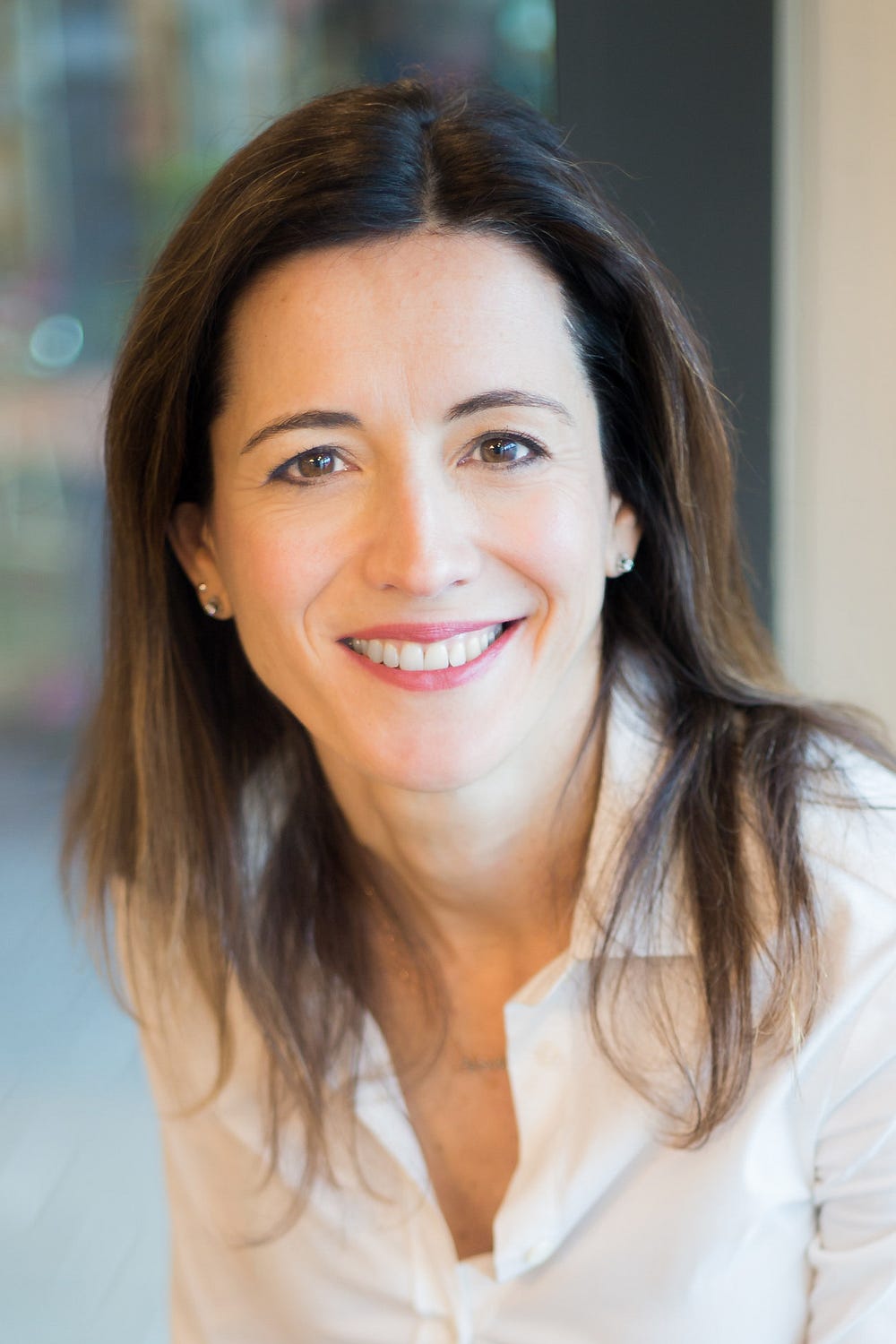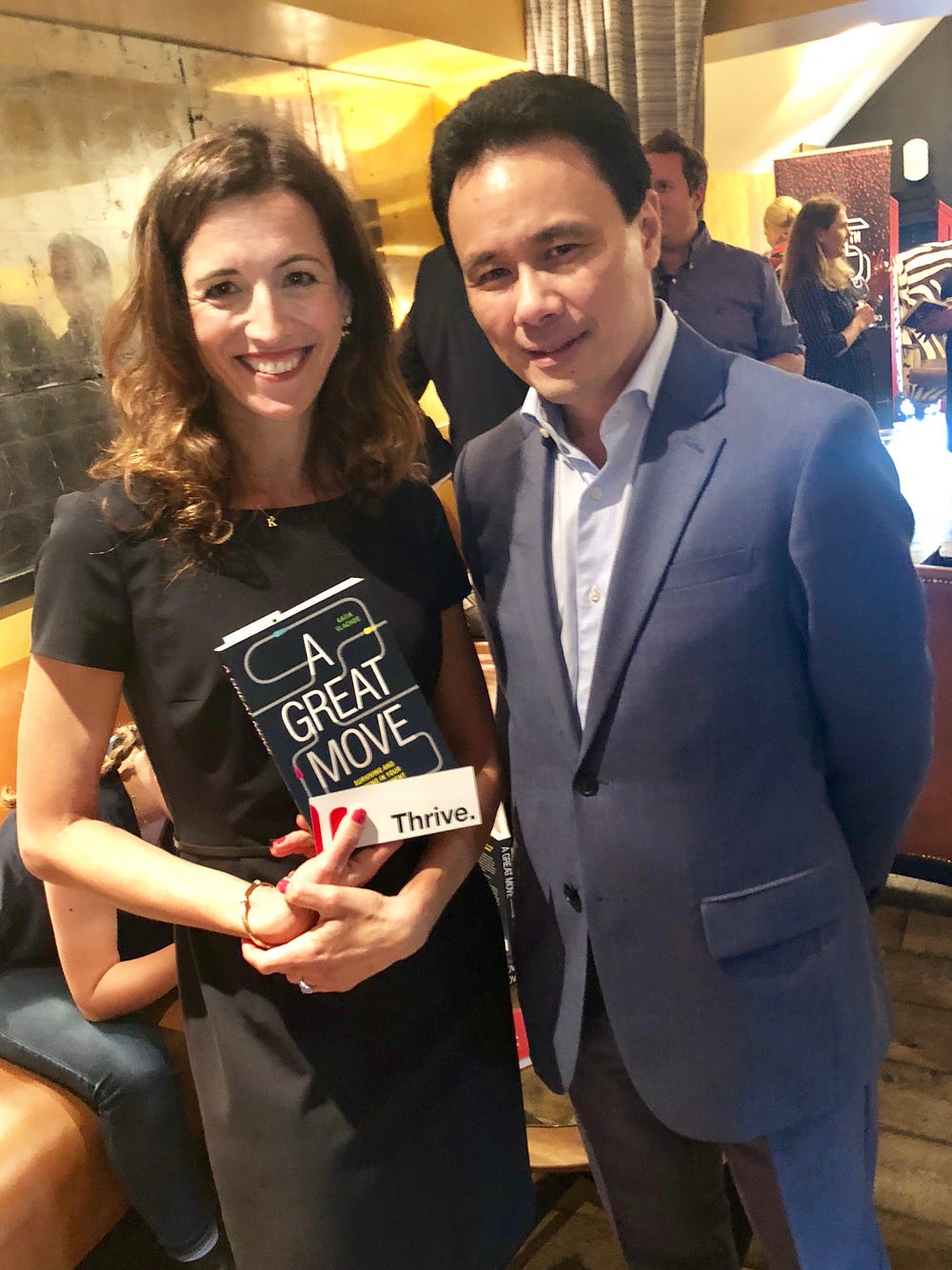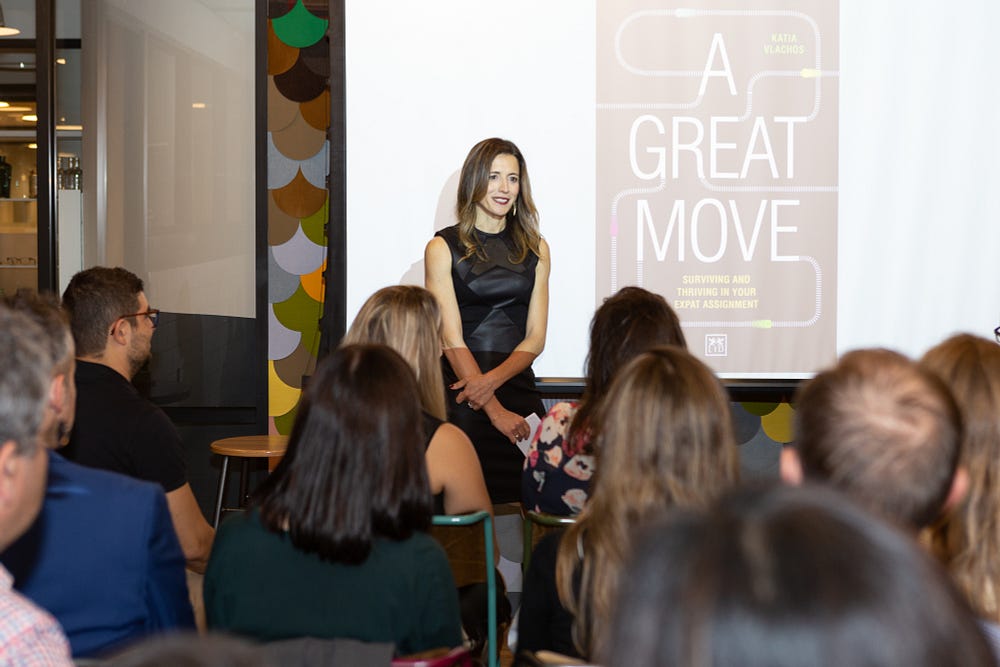
As part of my series about the “5 Things You Need To Know To Survive And Thrive After A Divorce Or Breakup” I had the pleasure of interviewing
Katia Vlachos who is cross-cultural adaptation writer, expat coach, and the author of A Great Move: Surviving and Thriving in Your Expat Assignment. Previously a researcher and policy analyst by training, she received a Master’s from the Kennedy School of Government at Harvard and a Ph.D. from the RAND Corporation. She has lived in 8 cities, 7 countries and 3 continents. Vlachos helps expatriates cope with many different kinds of transitions, including international relocations, career changes, reinvention and identity issues as well as relationship challenges and breakdowns which result from a mobile lifestyle. She has written for the Harvard Business Review, Huffington Post, Thrive Global, etc. and has a newsletter and free resources available for expatriates at www.katiavlachos.com.
Thank you so much for doing this with us! Can you tell us a story about what brought you to this specific career path?
I’m a writer and expat transition coach. I recently published a book (A Great Move: Surviving and Thriving in Your Expat Assignment, LID Publishing, 2018) on how to make successful international moves — with a focus on both the practical and the emotional aspects. I, also, coach expats and globally-mobile individuals who are going through different kinds of transitions — geographical, career-related or in relationship-focused.
It was my own divorce that launched me into this — my second — career as a coach. I’m a researcher by training; I often process experiences and emotions by turning them into a research project. When I was going through my divorce — in a foreign country, away from my support system — I started a research project on the challenges of coping with divorce while living abroad, which I planned to present at an expat conference. This included interviews with other expats who were experiencing relationship challenges. This revealed to me that what I was facing was not unique, but there weren’t resources available to support myself and others through this difficult process.
I decided to raise awareness around this issue by speaking at that conference, and afterward, I wrote a series of articles on this topic for the Huffington Post. At this point, I decided to train to become a coach, so I could provide the support expatriates need to work through their challenges and thrive in their positions. In the process, I broadened my focus to all different kinds of transitions that people face as they embark on their global journeys, which includes career and geographical moves. It has been a rewarding journey.
Can you explain to our readers why you are an authority about “divorce”?
I have been researching, writing, and speaking about divorce for a while now. In addition, I have been coaching — both formally and informally — people through relationship challenges and breakups (including divorce). And, of course, I have been there myself. I have been an expat for the past 23 years. I went through separation and divorce while living abroad, away from my country of origin. Divorce is a challenging process to start with; going through it in an unfamiliar place, away from your support system, makes it even more challenging. Despite the challenges I faced, I developed coping strategies and emerged from this experience transformed, both at the personal and at the professional level. I feel particularly passionate about sharing the message that it is possible to come out of divorce stronger and more empowered, and you can start a new life and thrive.
Can you share the most interesting story that happened to you since you started this career?
As I was working on my research project about expat divorce, one of my interview partners, who had just come out of a divorce herself, told me: “People need divorce coaches!” Up to that moment, the concept of divorce coaching had not been on my radar, but it became the trigger which led me to reinvent my career.
Can you share a story about the funniest mistake you made when you were first starting? Can you tell us what lesson you learned from that?
Even though I went through my coaching training and found my coaching work immensely fulfilling and fun, it took me a while to embrace my identity as a coach. That happened mostly because my identity as an author and expert in my field was so strong that it overpowered everything else. At some point, I realized — with the help of my own coach — that if I didn’t see myself as a coach, I couldn’t expect others to see me as one. Embracing that identity was a game-changer in terms of building my coaching career and business. This ‘mistake’ also reinforced the importance of identity in my life.

If you had a close friend come to you for advice after a divorce, what are 5 things you would advise in order to survive and thrive after the divorce? Can you please give a story or example for each?
- Find your support. Divorce is a complex process, both in practical and emotional terms so it helps to have as much guidance and support as you can get. I recommend assembling your ‘divorce team’ early on. This would include, ideally, someone who can provide legal advice, support with financial planning, career guidance (why not a divorce coach! ☺), without forgetting the crucial emotional support from friends, family, and qualified mental health professionals. Don’t hesitate to reach out and ask for help — you should not be doing this alone!
- Do your homework. Know where you stand, what to expect and how you will deal with it. This takes significant work and preparation, but it will help you feel more grounded and confident about coping with the process ahead of you. There are a lot of parameters involved in a divorce, so it helps to be (or become) knowledgeable about your situation — whether it’s your financial status, your legal rights and obligations, your future professional options, or other areas.
- Take care of yourself. Divorce is overwhelming. Self-care is essential to weathering the inevitable ups and downs and remaining balanced. This means trying to maintain healthy habits, such as exercising regularly, sleeping enough, and doing things that bring you joy, including indulging yourself from time to time. In my case, my weekly yoga class was a life-saver in helping me maintain both my physical and mental sanity throughout the whole process. I called it my weekly therapy. Actual therapy was also a huge source of support.
- Acknowledge the loss. Don’t be afraid to grieve the end of your relationship — and part of your life up to now. In fact, it is only by going through the cycle of grief that you will be able to let go, get to the other side, and re-start your life, including being able to build new bonds and new relationships. I am living proof that this works ☺
- Work on your mindset. I know it’s not easy, but I can’t stress enough how much it helps to focus as much as possible on the positive throughout this challenging process. Visualize what you want to achieve, who you want to be, and where you want to be post-divorce. Divorce isn’t just an end, but it’s also a new beginning; what’s the life that you want?
What are the most common mistakes people make after they go through a divorce? What can be done to avoid that?
- They sidestep the grieving process. Some people tend to shut down their emotions in order to protect themselves and be able to cope as they’re going through divorce. This means that they come out of the process without having gone through the normal cycle of grief. But their losses are with them and either they hold them back in various ways or they tend to catch up with them later on. That’s why it’s important to acknowledge — and grieve — the losses, as I mentioned.
- They isolate themselves. People going through (or having gone through) divorce may be reluctant to reach out to their social circles, either because they don’t want to burden others or put them in an awkward position, or because their changed circumstances make them uneasy socially (for instance, they may feel awkward reaching out to their social circles as a single person post-divorce, if they mostly socialized with other couples pre-divorce). As a result, their social connections are weakened, and they may have to rebuild most of their social circles post-divorce. Usually, this reluctance to reach out has more to do with how the person divorcing perceives the situation and is not necessarily rooted in reality. You need your social circles and a sense of connection even more when you are going through this tough process — why would you isolate yourself?
- They feel powerless. Especially if divorce was not their preferred option, some tend to see themselves as having limited or no options. What I have found — from my research and my own experience — is that there is always a choice, we just need to be able to see it. And to do that, we need to shift our mindset from one of victimhood to one of empowerment. Only then will we approach life with a sense of possibility and hope.
Do you have any favorite books, podcasts, or resources related to this topic that you would recommend to our readers?
There are a great number of books about divorce, so I’ll share with you the ones that I personally found most helpful and recommend to the people I support. For parents who are divorcing, I highly recommend the book Putting Children First: Proven Parenting Strategies for Helping Children Thrive Through Divorce by JoAnne Pedro-Carroll. It’s an extremely helpful guide into the children’s perspective of divorce and their needs according to age, with solid recommendations for supporting them through the process.I also found Crazy Time: Surviving Divorce and Building a New Life by Abigail Trafford really helpful in understanding and navigating the emotional stages of the transition, but also a valuable source of guidance for life after divorce.
Can you please give us your favorite “Life Lesson Quote” that helped you in this work? Can you share how that was relevant in your real life?
You always have a choice.
That’s a core belief for me and it’s powerful. Even when we think we are powerless, there are always choices; we just have to be able to see them. And to do that, we need the right mindset. This was a key lesson for me, because once I switched my mindset from victim to empowered, (good) things started happening.

Are you working on any exciting new projects now? How do you think that will help people?
My book was released in Europe in June and in the U.S. in September 2018, so I have spent a lot of time speaking, writing, and generally promoting the book both online and in person. I intend to continue doing that in the new year, not least because I enjoy it so much; but also, because I want to share the messages in the book as broadly as possible and help as many expats as possible to make sure they have successful moves and find their home wherever they are in the world.
I’m also continuing to build up my practice as an expat transition coach, which is, together with my writing and speaking, part of my mission to support people in creating fulfilling lives abroad. I give my clients the practical and emotional support they need to navigate their transitions, whether that means finding home in a new location, building a new professional identity, starting a new life after a breakup — or, often, more than one of those transitions at the same time. I find my work incredibly fulfilling and rewarding and a great way to give back to my (expat) community.
Because of the position that you are in, you are a person of great influence. If you could inspire a movement that would bring the most amount of good to the most amount of people, what would that be? You never know what your idea can trigger. 🙂
I want to continue being an advocate for people who go through relationship breakdowns while living abroad. My goal is to raise awareness of the challenges they face, so that, as a community, instead of staying away, we offer our compassion, support and resources to each other. So far, I’ve received very positive feedback and support for this movement, which encourages me to keep going — through my writing, speaking, and coaching activities.
Some of the biggest names in Business, VC funding, Sports, and Entertainment read this column. Is there a person in the world, or in the US with whom you would love to have a private breakfast or lunch with, and why? He or she might just see this if we tag them 🙂
Brené Brown. She’s a fellow researcher and I’ve always found her work both fascinating and inspiring. I’d particularly love to discuss her most recent work — and book — on leadership.

